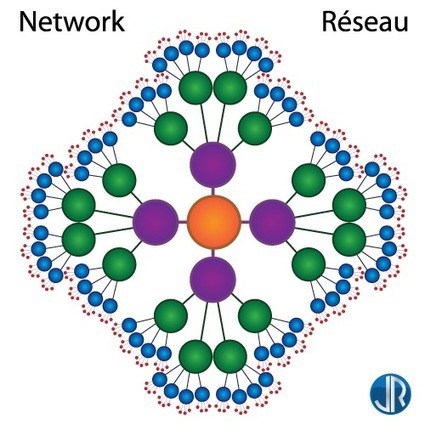 Your new post is loading...
 Your new post is loading...

|
Scooped by
nrip
|
ou've likely seen reverse leadership in action. It happens when someone not in a formal leadership role demonstrates great leadership ability: when a field service agent steps up with a solution to a persistent problem, for example; when a customer service rep inspires her colleagues through her exemplary customer-centric behavior. When someone on an account team improves dramatically after being constructively coached by a fellow team member. Reverse leadership doesn't replace regular leadership. Nor is it a sign that the official leaders in an organization are doing a bad job. Quite the contrary. Rarely does strong leadership ability show up at lower levels in the hierarchy if senior leaders aren't very effective in their roles. Some reverse leaders are people quite content to remain individual contributors, like the scientist who has no interest in managing a team but cares deeply about the company's mission. Others are young employees just approaching or on the first rungs of the formal leadership track. Still others have some leadership abilities but lack some vital element of leadership, like the sales professional who excels in creating strategy but doesn't yet have the skills needed to manage a sales team.

|
Scooped by
nrip
|
A case for trying to bring your customers into your decision making. Because they're not ignorant, selfish control-freaks. Imagine you’re having some big, high falutin’ meeting. Perhaps it’s a board meeting. Or, if you don’t have a board, perhaps it’s a management team meeting. Or, if you don’t have a team, perhaps it’s just you talking to yourself at 3:00 a.m. in the morning. Whatever mechanism it is you have to talk about important issues and make decisions, imagine that meeting. Are you imagining it? Good. Now, imagine that same meeting with one important change: One of your smart, savvy, customers is at the table. And, she has an actual voice. She’s a peer. She makes arguments, some of which are wrong and misguided, just like you and the rest of your team. If the customer were there, I think you’d have better meetings. Practically speaking, you probably can't actually put a customer in all your meetings. If that’s the case, you should act as if she’s there. Pretend like she’s sitting in the room. In the past, I’ve actually designated an empty chair in the meeting as being where the customer is, and looking in that direction while asking “what does the customer have to say?” (yes, I’m weird). When you’re trying to make an important decision, and you’re sort of divided on the issue, ask yourself: If the customer were here, what would she say? You don’t actually have to do everything she says, but it’s useful to at least factor in her point of view. Now, you might argue that you’re already factoring in customers in all of your decision-making. And, I’m going to argue that you’re wrong. You’re making decisions all the time where the customer’s voice is either absent or too weak. Just think back on the last five debates you had, and the decisions you made. Perhaps it was a pricing decision. Or a funding decision. Or an office space decision. Did the customer really have a voice? Was it as loud as everyone else’s? Probably not. You might then further argue that you have someone “representing” the customer (your head of customer support, perhaps). I’d argue that that’s different. Yes, your head of customer support is solving for your customers’ well-being, but that’s not the same thing. Imagine if you were running a hospital. You’d have operations, and finance and marketing and all sorts of other groups. In your big hospital meeting, you might think that the doctors represented the patient’s interest (because they are looking to solve the patient’s problem), but if you’ve ever been a patient, you know that’s not the same thing. Your hospital management meetings would be very different if there was a patient in the room. Your startup is no different. The decisions would be better if there was a customer in the room.

|
Scooped by
nrip
|
I did a post a few weeks ago on “thinking outside the motivational box,” and a number of readers wrote to me saying essentially that while creative extrinsic rewards are all well and good, in the end nothing is more effective than “a sincere thank you for a job well done.” This is a great point – just because something should be obvious doesn’t mean it always is. Two observations after decades of management 1) Recognition (or lack thereof) is always a key element of employee engagement.
2) In a business environment where people are extraordinarily busy and routinely asked to do more with less, all too often successful tasks and projects are completed without recognition for those involved.
The pace is frantic so when one job is done, it’s on to the next. Taking the exceptionally small amount of time it requires – by email, vmail, text, tweet, FaceBook, phone… or best yet (a novel idea) in person – to stop what you’re doing and say a simple thank you is one of the easiest, cheapest and best investments an executive can make. Appreciation can be a difference maker, just as silence can. A brief story from my own career… Back in another millennium I once wrote a speech for a chief operating officer addressing a major sales conference. The COO, a man of around 60, had made a habit of running three miles a day every day, literally never missing a day for over 700 days, even in the coldest months of a New England winter. The speech focused on his running and what it meant to him, but more importantly it was a metaphor for the day-in, day-out discipline that a top salesperson needs, and ultimately the satisfaction derived from such focused efforts. It was a personal, heartfelt message. I didn’t attend the conference, which was thousands of miles away, but the day after it ended I received at my home a large fruit basket. With it was a short note from the COO telling me simply how he appreciated my help with the speech and how well it had been received. That was many years ago. I never forgot the gesture, and you can be sure it forever shaped my opinion of the man and the lengths I would go to do my utmost best for him.

|
Scooped by
nrip
|
Q: What does the Instagram acquisition mean for startups?
A: A LOT.
At the close of 2011, there was a lot of uncertainty for startups. Stock market fluctuations, underwhelming talent acquisitions (“acqui-hires”), and structural investment problems threatened the prospects for startups. But what a difference a few weeks can make. The passage of crowdfunding legislation in the US coupled with the $1 billion acquisition offer of Instragram, signals the beginning of a full startup boom. In preparation for the good times, venture capitalists have started to raise new fund money at their pre-crash highs. Two and a half years ago, Mint.com was acquired for $170 million, and everyone thought that was an amazing deal following the great recession. Now, a fledgling company with a small team gets acquired for $1 billion. My best guess is that it is about to get crazy. And, only fools sit on the sidelines. Many strong and older entrepreneurs that I know are wealthy today because they made intelligent decisions during the dot-com bubble of the late ’90s. Success was not easy then, and it will not be easy now, either. But, the likelihood of a great outcome is much higher in a boom.

|
Scooped by
nrip
|
"If you're really passionate about what you do, but it's not going to make you a lot of money, should you still do it?" What a great question! What a great question! It seems like just about everyone who has ever addressed a graduating class of high school or college seniors has said "Do what you love, the money will follow." Inspiring. But it is true? Couldn't you do what you truly care about and very well go broke, as the question above (recently sent from one of our readers) implies? Based on the research we did for our book, we're convinced that when you're heading into the unknown, desire is all-important. You simply want to be doing something that you love, or something that is logically going to lead to something you love, in order to do your best work. That desire will make you more creative and more resourceful, and will help you get further faster.

|
Scooped by
nrip
|
A powerful network is the key to success in most marketing strategies. Your network is your most powerful tool when it comes to spreading messages. If you didn’t read it yet, I invite you to read my article “The basics of network marketing” explaining the involvement of a personal network in any business strategy. But to go further, to create real powerful network that you can use in a real business situation, you must change yourself into a Connector. Connectors rule the world Connectors have a power most people will never have: they always know someone. In this article I will teach you how to become a Connector and make the best use of this new ability to develop your business. If you do not know what a Connector is or if you would like to learn more about how to integrate Connectors in a global Viral strategy, please refer to my article “The art of starting an epidemic”. To summarize, Connectors are people who naturally have tons of friends.
Recognizing a Connector is pretty easy: if you have around you someone who goes out almost every day to meet some friends, this person is most probably a Connector.

|
Scooped by
nrip
|
Note: This is intended be a light-hearted piece that hits just close enough on some counts to (hopefully) be funny. Things Entrepreneurs Never Confess To Their Investors 1. You know that candidate you introduced me to? Well, he was kind of a schmuck. 2. We had our management team meeting yesterday and we've concluded that we're kind of screwed.

|
Scooped by
nrip
|
Health care, long ignored by VCs who didn’t understand it, is now so obviously broken that it can’t be ignored, Rock Health, the crusading seed incubator in San Francisco where I’m a mentor , has done a study of VC-funded healthcare startups. According to Rock Health’s survey, which is admittedly incomplete, 35 companies have received $2 million or more in funding in 2011 alone. But that’s only 2% of the startups. The rest, we can assume, are bootstrapping in one way or another. And although 2011 shapes up to be a record year in venture funding for the segment, surpassing the previous record year 2010, much remains to be done.

|
Scooped by
nrip
|
You may have missed this when it happened - that's okay, I'm sure most people reading this did. There's now a human capital software company called "Lumesse." I have no idea how to pronounce it (and I searched hard on their website), but I think it rhymes with "new mess." The point is, it's not a new company. Lumesse, formerly known as StepStone Solutions, said in their press release that "...the new brand is the first step in making Lumesse an increasingly high-profile, global player in the fast-growth talent management sector." I can't wait to hear what the second step will be.

|
Scooped by
nrip
|
Significant organizational development efforts generally bring some resistance. This is especially the case when the effort is in the people skills area. The raised eyebrows, folded arms, stiff half smile or other skeptical body language of a participating manager or leader say the following: Not more of this touchy-feely stuff! Resistance and skepticism come with the territory, however. Savvy consultants and trainers have to use their skills and knowledge to address the resistance. They must make the business case for the importance of the “touchy-feely stuff” as follows:

|
Scooped by
nrip
|
From the pager to the iPad, mobile devices have been enhancing our mobile productivity in one way or another for decades. From the pager to the iPad, mobile devices have been enhancing our mobile productivity in one way or another for decades. In their early days, mobile devices were largely business-focused. Since then, they have become sleeker, more powerful, and even more appealing to consumers and business users alike. On today’s mobile devices, you can run your business or play Angry Birds – or both! Read through the infographic below and take a walk through a history of mobile productivity. Discover the first portable handset. Learn how the groundwork for today’s app stores was laid in the 1990s. Reminisce over the earliest smartphones and tablets. Then, share with us where you think mobile productivity is headed next!

|
Scooped by
nrip
|
Your emotional maturity dictates your ability to adjust to adverse conditions, deal with difficult people, and move past obstacles. It may even impact how you read this. That’s because emotion colors everything we do; it’s like the current on a river, carrying us whether we’re aware of it or not. If we don’t adjust for it, emotion will carry us downstream from our goals every time. For a leader, failing to account for an emotional current can be disastrous. Here are four ways to avoid this fate and become a more emotionally mature leader:

|
Scooped by
nrip
|
I see a fair amount of business plans – it’s an occupational hazard. And over the years I’ve been asked by a few angel investors to assist vetting companies seeking financing. Not long ago I sat with a company to discuss their business plan. The CEO and founder of this start-up presented his operating and growth plan. His basic plan was to achieve a level of sales and raise another $8-10M in a future round of financing. They had all the charts, financial data, revenue forecasts, market studies, etc. Every chart was up and to the right — every conclusion was a tremendous return in years 3-5.
|

|
Scooped by
nrip
|
A lot of advice VCs give entrepreneurs seems to me versions of “make my job easier,” like how to write a great business plan, how to pitch, etc. In this case, I see him asking entrepreneurs to improve the signal-to-noise ratio so he can have an easier time funding companies. Nothing wrong with trying to make your life easier, but he makes the article look like he’s helping the entrepreneur, when he’s writing it to help himself, discouraging some would-be entrepreneurs who might love starting a company even if it didn’t make a VC money. For an entrepreneur who makes their business their life, leading the company may be its own reward, making his advice meaningless, since he’ll call it a success only if it generates a return on investment. At the very least, I’d appreciate the article more if he specified “Think twice before starting a company that might seek venture capital funding.” Most entrepreneurs I know never approach VCs. Did he forget few companies involve technology at all? His advice doesn’t apply to them. Well, except that thinking twice is obviously good advice to anyone, but his reasons for it. Entrepreneurship is far greater than starting tech companies looking for VC. I’d be wary of an investor who didn’t realize he put himself in such a bubble. With all that name-dropping, you can see how social bubbles can contribute to investment bubbles. If you love starting companies and you have an idea whose time is now, you’ll find a way to start your company. If you don’t need venture capital, hopefully you won’t hear his advice in the first place, or will realize it doesn’t apply to you. Even if you do want VC, if your firm eventually dies but you loved doing it and it helps you do better on your next one, it seems to me you’ve succeeded.

|
Scooped by
nrip
|
When I was working on building my first startup, Really Bad Things(TM) happened on an alarmingly regular basis. I was in my early 20s and living in Birmingham, Alabama (where there was no startup ecosystem at the time). So, when something happened that we thought would quite possibly kill the company, one of us (I had a co-founder) would freak out. Sometimes, both of us would freak out. Sometimes, we would freak each other out. Then, we would ultimately decide to take the Scarlett O'Hara (Gone With The Wind) approach — “I'll think about that tomorrow” and get back to work. After all was said and done, things worked out quite well. But, there were so many “near fatal” events, that we lost count. I've since done two more startups and spent time with many, many entrepreneurs — often in some of their darkest days. I have one piece of advice that's going to sound trite (because it is): Don't Freak Out. The reason I advocate not freaking out is that it doesn't help —and often hurts. What you want to focus on during these trying times is ensuring you don't go into a tailspin (often, when you panic after something bad happens, you cause more bad things to happen).

|
Scooped by
nrip
|
What kind of leaders do we need today? Steve Jobs — mysterious, charismatic, intriguing — is often cited as one of the recent greats, and there are clearly benefits to his style. A recent study showed that leaders like him — those perceived as having an almost magical aura — are seen as visionary, with employees and customers clamoring to touch the hem of their garments. But that kind of leadership also has its limitations. Succession is made harder by a towering and mysterious personality (good luck, Tim Cook). And, even more importantly, there's no formula for becoming charismatic. You could try to model others — emulating Jobs' cool reserve, exacting standards, and mercurial temper, for instance. But the nuances are subtle; you're just as likely to come off as aloof or entitled, rather than intriguing. The harder, but more rewarding, path as a leader is to make yourself known — to your employees, your customers, and the public. Here are three reasons the new leadership imperative is all about transparency.

|
Scooped by
nrip
|
If I had to pick one skill for the majority of leaders I work with to improve, it would be assertiveness. Not because being assertive is such a wonderful trait in and of itself. Rather, because of its power to magnify so many other leadership strengths. Assertiveness gets a bad rap when people equate it with being pushy and annoying. But that shouldn't stop you from learning to apply it productively (that is — in service to your strengths). More harm is done when people aren't assertive enough than by being too assertive. At least you know what pushy people think, but those who don't assert themselves can be keeping vital ideas hidden and useless when they don't speak up or speak too softly. So I'd assert that when you are able to balance this critical skill with your other leadership abilities, you greatly amplify your power and impact.

|
Scooped by
nrip
|
“Sleep, friends, p-sets—choose two,” is a common mantra at the Institute. But what happens when you add your own startup into the mix? The spirit of entrepreneurship at MIT is alive and well; a report published in 2009 by Professor Edward Roberts ['57, SM '58, SM '60, PhD '62], founder and chair of the Martin Trust Center for MIT Entrepreneurship, estimated that if the almost 26,000 companies founded by MIT alumni that still existed in 2006 were a country, it would have the 11th highest GDP in the world. MIT founded companies like Dropbox, a Web-based file hosting service founded in 2007 by Andrew Houston ’05 and Arash Ferdowsi ’08, and Quizlet, an online education tool that helps students study using flashcards and other learning tools, created by Andrew N. Sutherland ’12 in 2005, have almost become household names. With Facebook’s multibillion-dollar initial public offering announcement in February, no one can deny that the allure of startups for MIT students is higher than ever.

|
Scooped by
nrip
|
"Leadership" has changed when a decentralized group of people can take down a government. "The Value Chain" has changed when the customer is no longer just the "buyer" but also a co-creator.

|
Scooped by
nrip
|
Before news aggregators, content curators, and Google’s omnipotent algorithm, the world’s information was sorted by real human beings. In the web’s next phase, argues The IdeaLists’ Karyn Campbell, the old-fashioned editor is poised for a comeback.

|
Scooped by
nrip
|
With so many “experts” clamoring to be heard above the din online, it can be hard to stand out. However, I’ve found several sites that do seem to give consultants and small business owners the leg up when it comes to establishing expertise. Each of the sites lets you answer questions in your field, which expands your reach and helps build trust with potential clients.

|
Scooped by
nrip
|
In Blanchard’s work with culture clients, a key part of a successful culture initiative is the transition of the senior leader from a self-serving leader to a servant leader. Self-serving leadership is, unfortunately, a very strongly modeled approach to influencing others in Western society. Servant leadership is gaining strength – and high-performance, values-aligned cultures require it from their senior leaders. Source: www.drivingresultsthroughculture.com

|
Scooped by
nrip
|
The Context for Ethical Leadership is Broader Than You May Think
The context for understanding ethical leadership is evolving as we connect information from a wide variety of disciplines that have not traditionally worked together. Here are some quotes from the Leading in Context Blog that illustrate the edges of its context:

|
Scooped by
nrip
|
We hear a lot about how important it is to have a vision, whether for an organization or at the individual level. During my (too) long career in government I was part of numerous vision and mission-building exercises. Similar to those done in the private sector the results were often tepid and short-lived. This is not surprising since the North American mentality of wanting instant results without sustained commitment, combined with limited attention spans, pervades our organizations.

|
Scooped by
nrip
|
None of us is a genius. But occasionally genius comes knocking. Genius is what allows us to know without being taught. Genius produces ideas that are not an imitation or a first cousin to other ideas. Genius seems to come out of thin air. When does it happen?
When we are thoughtless. When we take a “creative pause”
|



 Your new post is loading...
Your new post is loading...























